Volume One – 55BC – 1485
The Romans to The Wars of the Roses
THE ROMANS
THE ANGLO-SAXONS
ALFRED THE GREAT
ETHELRED THE UNREADY
THE BATTLE OF HASTINGS
MAGNA CARTA
THE BLACK DEATH
THE PEASANTS’ REVOLT
THE BATTLE OF AGINCOURT
RICHARD THE THIRD
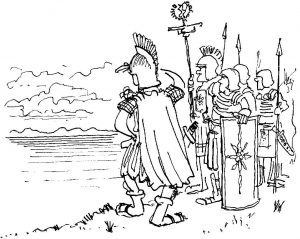
THE ROMANS
Julius Caesar, in 55 BC,
Gaul having been conquered (and no slouch he),
Decided, like many a tyrant before,
That Gaul was not enough. He wanted more.
Many there were who thought he was barmy,
Yet he set sail (with his Roman army)
For the fabled shores of Britain, where there dwelt
A tribe renowned for warlike deeds, the Celt:
Heroic hunter-gatherers, a breed
Skilled in the art of bronze, and fond of mead.
Only a short day trip, you understand,
A little recce (that was all he planned),
With a small force, nothing fancy or grand.
He made a quick survey, ten miles inland,
Then turned round. But Caesar liked what he saw.
The next year he was back, for all-out war.
This time the Romans were ready for battle
And slaughtered the Celts like so many cattle.
Their legions: well ordered, disciplined, first-rate;
The Celts in their chariots, all out of date.
Despite the heroic resistance of some,
The Age of the Roman had truly begun.
Or had it? Caesar suffered troubles in Gaul.
He and his successors had no time at all
For these rebellious Celts across the sea.
British gold (and slaves) were of poor quality,
And payment of tribute hard to guarantee.
Some Romans began tacitly to agree
With Caesar’s generals. They’d been largely right:
The Celtic campaigns were hardly worth the fight.
Almost a century passed before the occasion
Of the next, more significant, Roman invasion.
But Caesar left his mark: a growth in trade –
In skins, in precious metals, pearls and jade,
Exchange of ideas, how things were made.
Memories of conquest began to fade.
Britain forgot Rome, but not vice versa.
Julius Caesar was the precursor
Of Emperor Claudius. In 43 –
In the Year of our Lord, so now it’s ‘AD’ –
Claudius succeeded (unexpectedly)
His nephew, Caligula. Take it from me,
Caligula was weak and quite unable
To run a bath-house, let alone… ‘Unstable’
Is the word that I’d use. Assassination
Was too good for him. But his fascination
With all things British made him draw up a plan
For conquest, in detail to the very last man –
Which he called off the morning before it began.
Claudius was a funny sort of chap.
Folk thought he’d suffered some kind of mishap
At birth. Bookish and reserved, he stuttered –
And when he did speak, he simply spluttered.
Most of his life he’d been largely ignored,
But now he proved a wizard with the sword.
Sorry, that’s not quite true. He was rotten
At fighting, but his faults were forgotten,
Along with his foibles. He seized his chance,
Led his triumphant forces up through France
(That’s Gaul to you), his troops all cock-a-hoop,
And subdued the British in one fell swoop.
With 40,000 men – hardly surprising.
After resistance (and the odd uprising),
The Brits capitulated. Eleven Kings
Declared themselves Claudius’s underlings.
The Emperor, thrilled with these developments,
Rode in pomp to Colchester (with elephants).
The Roman Empire grew to this extent:
Due west to the Severn, north to the Trent.
Beyond these borders, in tougher terrain,
The Romans would suffer, time and again,
From raids and rebellions, pillage and plots,
By those wild marauders, the Picts and the Scots.
That’s the story for the next three hundred years,
Give or take. Empires, they always end in tears.
Spectacular was Queen Boudicca’s revolt.
The Romans weren’t expecting her assault.
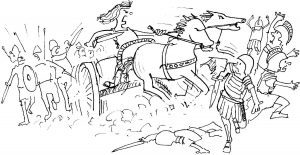
A taskforce of Brits and stormed, uninvited,
Through London and Colchester. Both she laid waste,
Which the Romans considered in pretty poor taste.
In due course of time the revolt was suppressed,
And Boudicca cruelly tortured (you guessed).
Soon the invader began to feel at home,
Aping the manners of Imperial Rome.
Aquae Sulis was established as a Bath,
Where the ruling classes went to have a laugh.
And those Roman roads: Watling Street, the Fosse Way –
Straight as a die, and with us to this day.
Back to top / Buy the book
THE ANGLO SAXONS
Centuries passed, shrouded in mystery.
Bede’s great Ecclesiastical History –
Hundreds of years on, in 731,
A fine work of scholarship, second to none –
Is one of the few records to survive.
But Bede, remember, wasn’t writing ‘live’:
He learned from sources, sixth- or seventh-hand,
How the first ‘English’ settled in the land.
Saxons (from Saxony), Angles and Jutes
Set sail in their thousands to put down roots –
Landing at first on the lowlands of Kent,
Sowing destruction wherever they went.
Bede’s Germanic ancestors were rough,
Warlike, ruthless, battle-scarred and tough –
Storming through the country with fire and sword,
A wild, undisciplined, unruly horde.
Audacious deeds bound brigands together,
Loyalty to lord, whatever the weather.
Settlers chanted sea-faring sagas,
Celebrating feats of famous forefathers:
Savage, romantic, people of passion –
Hacking to death, according to fashion.
By the mid-sixth century, all agree
That Britain (or ‘England’) was a ‘Heptarchy’ –
Seven kingdoms. Wessex, Mercia, Kent
And East Anglia (to a lesser extent)
Were the major players, with (in the north)
Northumbria, up to the Firth of Forth.
Don’t be deceived. There was no unity,
No sense of ‘national community’.
You’ve heard of the Dark Ages. These were they,
Tribal warfare the order of the day.
Civilisation went badly astray.
In Gildas’s words: “Wicked tyrants held sway.”
Back to top / Buy the book
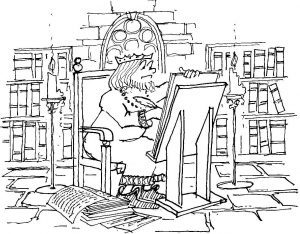
ALFRED THE GREAT (871 – 899)
The famous reign of Alfred ‘the Great’
Got off to a shaky start. The first spate
Of light skirmishes with the Danes he lost.
Then, for years, he was obliged (at great cost)
To bribe the heathen hordes to stay away.
Somehow he staggered on from day to day,
Until finally, in 878,
It appeared that his (and Wessex’s) fate
Was sealed. The Danish army had been split:
Half went to Northumbria (Halfdan’s bit);
The other (Guthrum’s) mounted a huge attack
On Wessex. Alfred’s meagre band was forced back,
In disarray, to its most western point yet:
Athelney, in the far reaches of Somerset.
Alfred took stock. Wessex stood alone.
Head on the block, he was now on his own.
Yet the folk of Somerset, one and all,
Rose up, to a man. They answered his call,
Flocking to their King, and serving him well.
Victory beckoned, I’m happy to tell,
For, at Ethendune, the terrible might
Of the enemy force was put to flight:
A miracle, truly, that’s what I say,
Given the huge odds. Be that as it may,
The men of Wessex did wonders that day.
Guthrum was immediately baptized.
I suppose it can only be surmised
That he was so overcome and distraught
By defeat (he wasn’t the losing sort),
That he must have discerned in it, somewhere,
The hand of God. Thereafter, he took care
Not to mess with Alfred. Guthrum agreed,
Rather politely, that there was no need
To interfere with Wessex any more.
Land north-east of a certain line (Danelaw)
Stayed Danish, to which Alfred assented.
The Treaty of Wedmore represented
A blueprint for peace and security,
As Alfred’s reign grew to maturity.
Of course, he didn’t rest on his laurels.
A wise leader, he knew there’d be quarrels
With neighbours to the west, and with Danelaw.
But this noble King preferred peace to war.
I say ‘King’. Though not King of ‘England’ yet,
I should be quite prepared to lay a bet
That all Saxons, in Danelaw and without,
Saw Alfred as their King, I have no doubt.
From now, until his death in 899,
Alfred’s influence was wholly benign.
He translated Bede’s massive History
Into Anglo-Saxon, a mystery
How he found the time. Apart from its length,
He had to learn Latin, from scratch. His strength,
As a scholar, was his dedication
To literature and education.
He himself wrote books on theology,
On history, warfare and geography.
The Anglo-Saxon Chronicle was his
(At least, he commissioned it) and it’s this
That marks him out. He exhorted others –
A lesson learnt from his elder brothers –
To harness their energies, pull their weight,
And use their talents to make Wessex great.
Nor were Saxon defences neglected.
Men this side of Danelaw were expected
To help construct forts. A navy was built,
And London garrisoned up to the hilt.
All down to Alfred. Aged fifty, he died.
What of his character? The man ‘inside’?
We’ll never know, but I’d hazard a guess:
Great in a crisis, good under stress,
Led from the front, but nevertheless
Sensitive, modest and shy of success.
Back to top / Buy the book
ETHELRED THE UNREADY (979 – 1016)
‘Ethelraed Unraed’: kindly note the pun.
Dubbed ‘the Unready’ by everyone
In succeeding generations, ‘Unraed’
In fact means ‘the Ill-advised’. So, instead
Of ‘the Unready’, I put it to you,
It simply means that he hadn’t a clue.
Please be aware, then, of at least one thing:
‘Ethelraed Unraed’ was a dreadful King.
Early on, he managed to muddle through.
Well, if you’re a weak King you do, don’t you?
But, within a few years, the deadly Dane
Had raised his ugly, hairy head again.
Denmark had a new King, the young ‘Forkbeard’ Sweyn,
A thorn in Ethelred’s side throughout his reign.
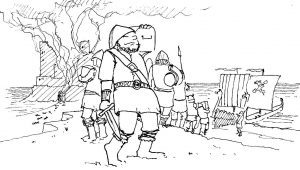
First forays occurred once in a blue moon.
But Forkbeard, sensing England’s weakness, soon
Ordered regular and repeated raids
On the east coast. Ethelred and his aides,
Cowards to a thegn, offered the Danes money
(This would be sad if it wasn’t so funny),
Saying, “Now, chaps, please don’t come back again!”
A healthy sense of humour had the Dane.
He merrily launched more widespread attacks,
Accepting ‘Danegeld’ as a kind of tax.
The inhabitants of the old Danelaw,
Unhappy under Ethelred, now saw
Occasion to side with the invaders,
Seeing them less as marauding raiders
Than long-lost second cousins. Ethelred,
In a state of panic, took to his bed
For seven days, without food or water.
When he got up, he ordered the slaughter
(Imagine) of every single Dane
In the land, then went back to bed again.
Mad, quite mad. Though accounts are distorted,
Mass killings of Danes were reported –
At Oxford, for example. Forkbeard Sweyn,
A formidable military brain,
Landed in person, hell-bent on revenge,
Making raids inland as far as Stonehenge.
Ethelred was finished. In 1013
He took refuge in Normandy (his Queen
Was Norman). Sweyn, now King in all but name,
Was welcomed in his stead to great acclaim.
Back to top / Buy the book
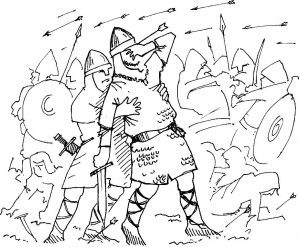
THE BATTLE OF HASTINGS (1066)
Harold, brave and bold, might have borne the brunt
Of one invading army, on one front;
But Harald Hardrada attacked the north,
Just as William was poised to set forth
From Normandy. He was delayed by rain,
Wind and foul weather, and had to refrain
From sailing. This gave King Harold’s forces
The chance to march north (they had few horses):
Exhausting or what? Harald and Tostig
(King Harold’s traitor brother, and a pig)
Were met at Stamford Bridge and defeated,
The battle a rout, bloody and heated.
Harald and Tostig both were slain. Good show.
One invading army down, one to go.
Three days later (the end of September –
This is now 1066, remember),
Harold received the news he’d been dreading:
William had landed, last seen heading
Up the beach at Pevensey. He’d arrived.
Harold’s soldiers (the ones who’d survived)
Finished their sandwiches, took a deep breath,
Then headed south to keep their date with Death.
William’s forces were well drilled and fit.
They say he burnt his boats, so couldn’t quit.
Moreover (and this was quite inventive),
He offered his men no mean incentive:
After the Conquest, his barons and knights
Were set to share in estate-holding rights,
Each taking a stake in the Duke’s success.
They were fighting for land – no more, no less.
Modest in number, disciplined and lean,
William’s men, in short, were very keen.
Young Harold, still on something of a high,
Faced the crisis of his life: triumph or die.
King for under a year, and King by right,
His courage was up. He spoiled for a fight.
William, having had weeks to prepare,
Was expecting Harold, but ‘when’ and ‘where’
Were good questions. He could only sit tight
(Spending night, they say, after sleepless night)
And wait. King Harold chose an imposing spot:
Top of a hill (near Hastings). Like it or not,
The Duke (the aggressor) was forced to attack.
Uphill. Against a shield-wall. And on horseback.
Harold’s military tactics were very clever.
William couldn’t turn back. It was now or never.
From dawn to dusk, a bloody battle raged –
Norman and Saxon, bitterly engaged;
Sword against hatchet, battle-axe on shield.
William attacked. Harold didn’t yield.
Anglo-Saxon, heroic to the end,
He had, he knew, his birthright to defend.
So when he fell, an arrow to the eye,
All England mourned, and I shall tell you why.
They loved and feared their King, though few yet understood
Their Anglo-Saxon world had disappeared – for good.
Back to top / Buy the book
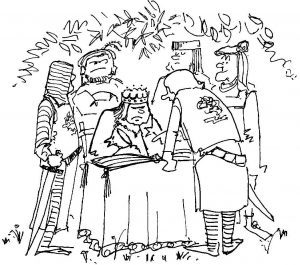
MAGNA CARTA (1215)
The barons were revolting (John’s joke, not mine),
And in 1215 forced the poor King to sign
Magna Carta, by the Thames, at Runnymede.
This great Charter, it’s fair to say, sowed the seed
Of Civil Liberties in Britain to this day.
“No freeman shall be imprisoned, taken away,
“Exiled, or otherwise destroyed in any way
“Except by the lawful judgement of his peers
“Or the law of the land.” For eight hundred years
Magna Carta has stood the stern test of time –
A solid constitutional paradigm
In rocky reigns, like that of Charles the First,
When royal tyranny was at its worst.
The Charter prevented John raising feudal dues
Beyond what law and custom permitted. Good news
For the taxpayer. John, renowned for his short fuse,
Could huff and puff all he liked, but couldn’t refuse.
“No taxation without representation”,
A cry that’s gone up from the British nation
Over the years, isn’t out of the Charter –
But the contract John signed was a good starter.
The King no longer stood above the law –
That’s it in a nutshell. Never before
Had limits on his power been spelt out
Quite so explicitly – without a doubt,
A major landmark. The country as a whole
Supported the barons’ efforts to control
The Crown. Stephen Langton, Archbishop of Canterbury,
Offered his backing. Freemen. Londoners. Everybody.
Back to top / Buy the book
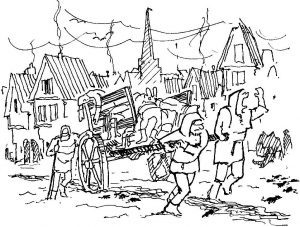
THE BLACK DEATH (1348-9)
Edward the Third was popular, his stock
At an all-time high. However, a shock
Of seismic proportions was set to break –
This time not a political mistake,
But an Act of God. The ‘Great Mortality’,
So-called, carried off, in its totality,
Over one third of the population.
The Black Death devastated the nation.
Spread in all probability by rats,
Off the ships, it struck down aristocrats
And serfs alike, the poor and the wealthy,
Though (strange to say) the young, fit and healthy
Were the most at risk. The rats carried fleas,
Who hopped off their hosts and spread the disease.
The plague first surfaced in 1348,
In Dorset, and spread at an alarming rate
Across the south. The graveyards of Somerset
And Devon were soon full to bursting, and yet
The Death raged on. Fields and open spaces
Were used as makeshift burial places.
In terms of human misery and grief,
The great ‘visitation’ defied belief.
As London succumbed to the disaster,
The plague swept further north, ever faster.
Some towns and villages were left without
A single living inhabitant, without doubt
A huge, humanitarian catastrophe.
Perceived, however, demographically,
This sudden decline in the population –
The ‘slimming down’, as it were, of the nation –
Doubled the cost of labour at a stroke.
The peasant, your average working bloke,
Could command higher wages. His rent fell
And, if he played his cards right, he did well.
The surviving landowners, conversely,
Were wrong-footed, and suffered adversely.
The spectre of the deserted village,
With its dearth of labourers, meant tillage
(Or ploughing) of the land came very dear.
Rather than lose more income, year on year,
And suffer nervous stress from loss of sleep,
Landlords changed the user of their land to sheep.
“Every cloud…” as they say. Trade in wool,
For centuries, kept England’s coffers full.
The Death, a clear expression of God’s wrath,
Simply encouraged men to weave more cloth.
The closing months of 1349
Showed mortality rates in sharp decline.
A bitter winter (snow, ice, a big freeze)
Killed off billions of plague-ridden fleas.
Hundreds of thousands of rats simply starved
Or froze to death, their numbers more than halved.
The human survivors drew a deep breath,
Buried their dead, and cocked a snook at Death.
Back to top / Buy the book
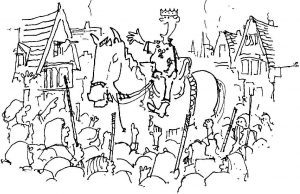
THE PEASANTS’ REVOLT (1381)
When Richard the Second, son of the Black Prince,
Succeeded his grandfather, it was years since
An underage monarch had sat on the throne –
1216, to be precise. It was well known
What a wretched time poor Henry the Third had,
When, aged nine, he succeeded King John, his dad.
Richard, at ten, was barely one year older,
But, as a character, stronger and bolder
Than Henry. This augured well. Nevertheless,
His government depended, for its success,
On his guardians. His uncle, John of Gaunt,
Whose hatred of the Black Prince would come to haunt
England for generations, sat at the head
Of Richard’s Minority Council. Instead,
However, of heeding the old King’s mistakes
In the failed French campaigns, he too raised the stakes.
Nor were these all that he raised: the final straw
Was a new tax imposed to finance the war,
Levied per head (a ‘poll tax’) of one shilling.
By 1381 few men were willing
To pay this ‘Evil Subsidy’. An assault
On the Establishment (the Peasants’ Revolt),
By a poor and disgruntled population,
Threatened the very fabric of the nation.
The rebels, mainly from Essex and from Kent,
Converged on London, recruiting, as they went,
Bands of discontented followers. They sacked
The houses of the justices; they attacked
And set fire to prisons; they stormed the Tower.
Richard, in what some called his finest hour,
Rode to meet the insurgents. Picture the scene:
The King of England, a mere lad of fourteen,
At Mile End, on horseback, alone, facing down
Thousands of rebels, in defence of his crown.
Unfaltering of voice, he pledged to redress
All proven grievances. He promised access
To his ministers. Pardons were guaranteed,
With fairer taxation according to need.
Promises of feudal emancipation
Were offered to peasants across the nation.
He was cheered to the rooftops! Most noble King!
But Richard’s cynicism was sickening.
Not one pledge did he honour. And no prizes
For guessing the outcome of the Assizes.
Rebel agitators were hanged by the score,
The price for stirring up the truculent poor.
Back to top / Buy the book
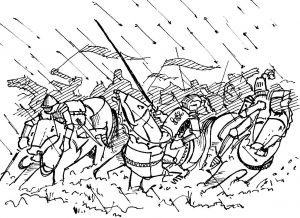
THE BATTLE OF AGINCOURT (1415)
Henry the Fifth’s brief reign was dominated
By war with France. Treaties negotiated
By his cousin and, to a lesser extent,
His father were torn up. The King was hell-bent
On conquest. Even the Treaty of Calais –
In which Edward the Third, after a bad day,
Had renounced his long-held claim to the French crown
In return for Aquitaine – was dusted down
And found wanting. Old Angevin holdings (Maine,
For instance, even Normandy and Touraine),
In addition to our old friend Aquitaine,
Were put on the list, along with other lands
Which had never even been in English hands.
What motivated Henry? Perhaps he’d learnt
From his own father, who’d had his fingers burnt
By squabbles born of internal division.
Warmongering abroad was a decision
More to do with cynicism than morals –
Busying “giddy minds with foreign quarrels,”
As Will Shakespeare, a fellow poet of mine,
Puts it so succinctly in his play. Well, fine,
If you reckon trouble at home’s an excuse
For invading a sovereign state. Abuse,
I call it: abuse of position, of trust,
Of due process. This craven cry of “needs must”
Is cowardly and crude, and holds no water –
A pitiful excuse for wholesale slaughter.
Charles the Sixth of France was past it, half-insane –
A sad figure, quite frankly, and a tad vain.
Not a bad man, he underestimated
The full extent to which the French were hated
By the Brits. Loathed. Despised. By 1415
The whole nation was fired up, hungry and keen
To have a crack at ‘the frogs’, their age-old foe.
By August, they were bursting to have a go.
With an army of 11,000 men,
Henry invaded Normandy. One in ten
Succumbed to deadly sickness. Decimated,
The army soon rallied, and celebrated
An unexpected victory at Harfleur.
The French, despite this hard blow to their honneur,
Reckoned that in human terms the greater cost
Fell on the English, who were thought to have lost
Half their forces in battle, or to disease.
The brave survivors were ready, if you please,
To fight on. Henry preferred a change of tack:
Strategic withdrawal rather than attack.
He marched (via Agincourt) towards Calais,
But encountered a huge force blocking his way:
Over 20,000 French, some mounted knights.
Our lads were outnumbered four to one. By rights,
It should have been a massacre, and it was –
But the other way round! And this all because
The French, on horseback, lacked the mobility
Of our English archers, whose agility
And fleetness of foot gave them the upper hand.
The French, advancing through waterlogged land,
Quickly got bogged down. Imagine the scene:
Massed ranks of bowmen, agile, fit and lean,
Facing heavily armoured horsemen stuck,
Up to their fetlocks, in slush, mud and muck.
Sitting targets! As the first French knights fell,
More horses piled in behind them, pell-mell.
Five thousand English archers drew their bows
And the rest, as every schoolboy knows,
Is history. Before the French could draw breath,
Our brave boys waded in and hacked them to death.
Enemy losses defy credibility:
Twelve members of the senior nobility;
Fifteen hundred knights; and, from the more humble ranks,
Nearly five thousand men-at-arms. Henry gave thanks,
Of course, to God. Why the Almighty chose our side
(The underdog, perhaps?), I’ll leave you to decide.
But we did enjoy divine support, quite clearly,
For, while the perfidious French suffered dearly,
We lost fewer then five hundred and fifty men.
Thanks, God! It’s good to know, every now and then,
That England can count on Your support. Anyway,
On October the 25th (St. Crispin’s Day)
The famous English victory at Agincourt
Altered the entire course of the Hundred Years’ War.
Back to top / Buy the book
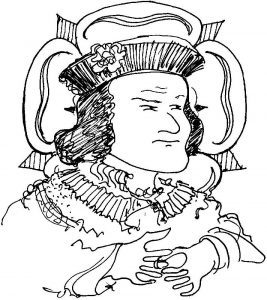
RICHARD THE THIRD (1483 – 1485)
The whole issue is fraught with controversy,
But Richard the Third, a man without mercy,
Conscience or scruples, was a downright despot,
A murderous tyrant and a thoroughly bad lot.
Edward the Fourth had left two little ones,
Edward and Richard, his surviving sons.
When their father died, Edward succeeded:
King Edward the Fifth. England then needed
A Lord Protector. Enter Uncle Dick.
Richard of Gloucester was clever and quick.
Edward was twelve and his minority
Would not last long. Richard’s priority
Was, first, to ensure his own survival,
Then to clear the way of any rival.
Lord Hastings, loyal brother of the Queen,
Was swiftly executed. More obscene
Was Richard’s subtly argued contention
That his nephews were bastards. Pure invention,
But the Lords and Commons, believe it or not,
Swallowed (hook, line and sinker) Dickie’s vile plot.
The Lord Protector announced the postponement
Of Edward’s coronation. His enthronement
Never took place. He was sent to the Tower,
And his uncle crowned King within the hour.
‘Prince’ Edward subsequently ‘disappeared’,
Along with his kid brother. Few folk cheered
At King Richard’s coronation. Foul play
Was suspected. His support ebbed away.
The Princes’ bodies were never recovered,
Though two little skeletons were discovered,
In the Tower, in 1674 –
Strongly suggesting that someone broke the law.
Richard of Gloucester was only thirty
When he was crowned. Fond of playing dirty,
Some say he may have been responsible –
Hard to say, but it’s not impossible –
For Henry the Sixth’s murder in the Tower.
Richard would stop at nothing to seize power,
But this was no way to win friends. His allies
Deserted him, as they came to realise
That, despite his undoubted ability,
He could never deliver the stability
His war-weary subjects so desperately craved.
If Richard hadn’t been quite so badly behaved
(That’s a euphemism), he might well have survived.
But war fever in the kingdom quickly revived
With the landing, in 1485, from France,
Of Henry Tudor, with a small force. At first glance,
Henry’s prospects were grim. His claim was tenuous,
To say the least, and Richard strenuous
In his defence of his crown. They met at Bosworth Field.
Heavily outnumbered, Henry refused to yield.
Brave and defiant, he fought on the side of right,
While Richard’s supporters were too ashamed to fight.
England was exhausted, her new King bankrupt,
The old Yorkist line was broken and corrupt.
The treacherous tyrant met his end that day,
Fighting for his life. There was no other way.
He lived by bloodshed, murder and deceit –
So died he in dishonour and defeat.
Back to top / Buy the book

